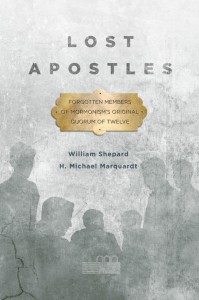 Title: Lost Apostles: Forgotten Members of Mormonism’s Original Quorum of Twelve
Title: Lost Apostles: Forgotten Members of Mormonism’s Original Quorum of Twelve
Authors: William Shepard and H. Michael Marquardt
Publisher: Signature Books
Genre: Mormon History
Year Published: 2014
Number of Pages: 400
Binding: Hardcover
ISBN13 978-1-56085-228-5
Price $35.95
Have you ever put on your winter coat for the first time of the season, reached into the pocket, and pulled out a forgotten twenty-dollar bill? The feeling of elation upon discovering an unexpected treasure is what awaits Mormon history aficionados when they pick up “Lost Apostles,” by the two highly qualified and veteran historians William Shepard and Michael Marquardt. The book recovers the long-ignored stories of six of the original members of the Mormon Quorum of Twelve Apostles: the acquisitive Lyman Johnson, his brother and physician Luke Johnson, the intellectual John Boynton, long-misjudged Thomas Marsh, Restorationist seeker William McLellin, and the privileged libertine William Smith.
Shepard and Marquardt begin with a purpose in mind: “we would very much like to correct the injustice we feel has been done to the memory of these men.” As seasoned historians and coming from two different perspectives regarding Mormonism, the authors present their evidence objectively and leave the final judgment to the reader. Nonetheless, they point out, “our disappointment is over the embarrassment the churches today feel over the apostles’ perceived betrayal, which makes it almost impossible to quote these men as authorities on doctrine or history.” This is unfortunate, as these first apostles were eyewitnesses of some of the most formative events in the early Restoration movement.
What is to be gained by studying these six excommunicated apostles? Shepard and Marquardt provide much-needed context to their departures. Present-day apostle Dieter Uchtdorf, in the October 2013 General Conference, said:
sometimes we assume [that people leave the church] because they have been offended or lazy or sinful. Actually, it is not that simple. In fact, there is not just one reason that applies to the variety of situations.
A good place to investigate the phenomenon Elder Uchtdorf describes is among the earliest Quorum of the Twelve. The authors of “Lost Apostles” provide some of the details of the failure of the Kirtland Safety Society, the power dynamics between apostles and the high council, and the excesses of religious militarism which prevailed in 1838 Missouri to explain the real issues that the apostles faced, and the different ways each man responded to these pressures. For example, dismissing Thomas B. Marsh for leaving the church over an argument about milk strippings trivializes the often-complex calculus that went into his criticism of the Mormon prophet.
“Lost Apostles” is loosely organized by topic. The six disaffected apostles and other early Latter-day Saints are followed through their discovery of Mormonism, their missionary experiences, the Kirtland, Missouri and Nauvoo periods, and the succession crisis and leadership struggle upon Joseph Smith’s death. The paths of each apostle are traced after his disaffection until his eventual demise. Each responded a bit differently to excommunication. Two of the apostles reconciled with Brigham Young’s group of Saints, following them across the plains to Utah. Two apostles found success in endeavors outside Mormonism. Two more explored the varied and divergent paths of other would-be successors.
This book is not intended to present the basics of LDS church history. The authors assume that the reader is generally conversant with Mormon foundational events; those who are not may find the book confusing, or even disturbing. Some may not be aware that so many of the early leaders of the church left or were excommunicated for a time. This included all of the three witnesses to the Book of Mormon, several members of the First Presidency, and the majority of the Twelve. Many Mormons today are comfortable with the idea of a First Presidency supported by Twelve Apostles as the governing council of the Church. They may not realize that the current relationships between the various Quorums is the result of a hard-won compromise, characterized by bitter infighting and political negotiation among these groups. It may be a surprise that all of the members of the re-established Quorum of Twelve practiced polygamy in Nauvoo, while officially denying the practice—or that many of the first plural marriages were polyandrous. “Lost Apostles” makes no secret of the fact that between 40 and 50 percent of the membership of 1844 left Mormonism over succession issues in the first ten years after Joseph’s death. Any apology or facile explanation of these matters is prudently avoided by the authors, but could be troubling.
Shepard and Marquardt choose not to address complex theological developments in this work. Overall, this is an effective strategy, and improves readability. However, while it is generally peripheral to their subject, there are times when some discussion of underlying theological considerations would aid in understanding. For example, William Smith is presented as feeling entitled to special privileges because he had “royal blood.” The common reader might understand this to mean that he was advantaged by virtue of being the brother of Joseph Smith. In fact, the term “royal blood” had a particular meaning to the nineteenth-century church. In speeches by both Joseph and Brigham, this term was used to mean that some of the early leaders were literal descendants of Jesus Christ, heir to the throne of David. Another area lacking sufficient development is the discussion of Danite activity during the Missouri war. The authors fail to provide adequate information regarding the involvement of church leadership in rising Mormon militarism. The apparent participation of Joseph Smith and Sidney Rigdon in Mormon aggression in Missouri is key to appreciating the apostles’ disaffection, and warrants further clarification.
In the past, the six “lost apostles,” Luke and Lyman Johnson, John Boynton, Thomas Marsh, William McLellin, and William Smith have been dismissed, disparaged, and disregarded. This book invites the larger Mormon audience to revisit the traditional history surrounding these individuals and make a fairer appraisal. Authors Shepard and Marquardt present their strengths and weaknesses in a broader context, unencumbered by the emotions and prejudices of the past. The story of the Restoration is not just gathering, but scattering; not just meeting, but parting; not just joining, but separating. These first apostles belong to us. We can choose to appreciate them and own them the same way we do the other six. We can thank them for the sacrifices they made even if we don’t approve of everything they did. A sympathetic reading of the prodigal half-quorum is key to reclaiming our own lost children of the restoration.

Pingback: Signature Books » Lost Apostles
Really hoping for a Kindle version of this.
Pingback: Signature Books » Mormon News, Week 22, May 26–30
As a direct descendent of Luke Johnson, I have not until recently felt comfortable acknowledging the relationship. And when I did mention this genealogical fact, I felt obliged to tack on “you know Luke came back to the fold, went west, and served as a bishop before he died. I once devoted a Sacrament Meeting talk to Luke Johnson’s problem but there was almost no public reaction. Excommunication is a powerful word and carries connotations that are awkward at best in a Mormon context. This book will make it more likely that Luke and Lyman can be discussed without embarrassment in future family gatherings.
I think this is much needed. Too many want our early church leaders in red boots and a cape. Sidney Rigdon is one of my favorite characters and added a tremendous amount to the early church. There is good reason to believe he wrote much of the lectures on faith and helped direct Joseph to important theological questions. But most people only remember his late apostasy and his salt sermon. There is little understanding of what he sacrificed or how his head injury from a Kirtland mob may have effected him. There were so many complicated factors in this men’s lives, we need to appreciate the good and not judge their human failings.